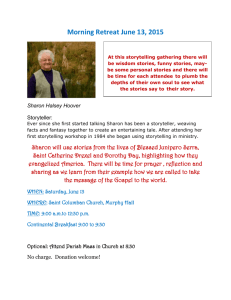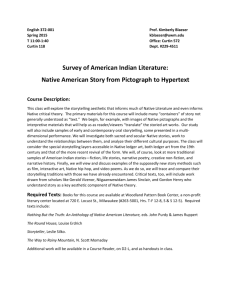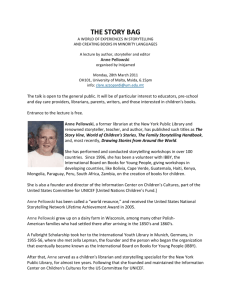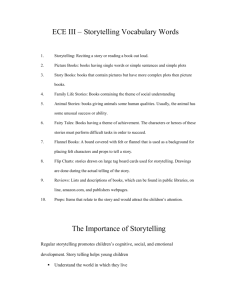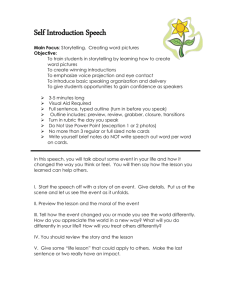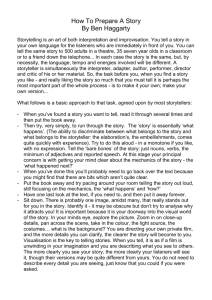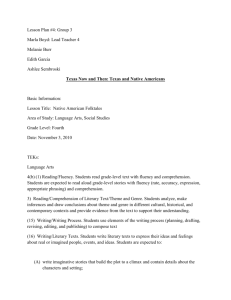Promoting Storytelling Events
advertisement
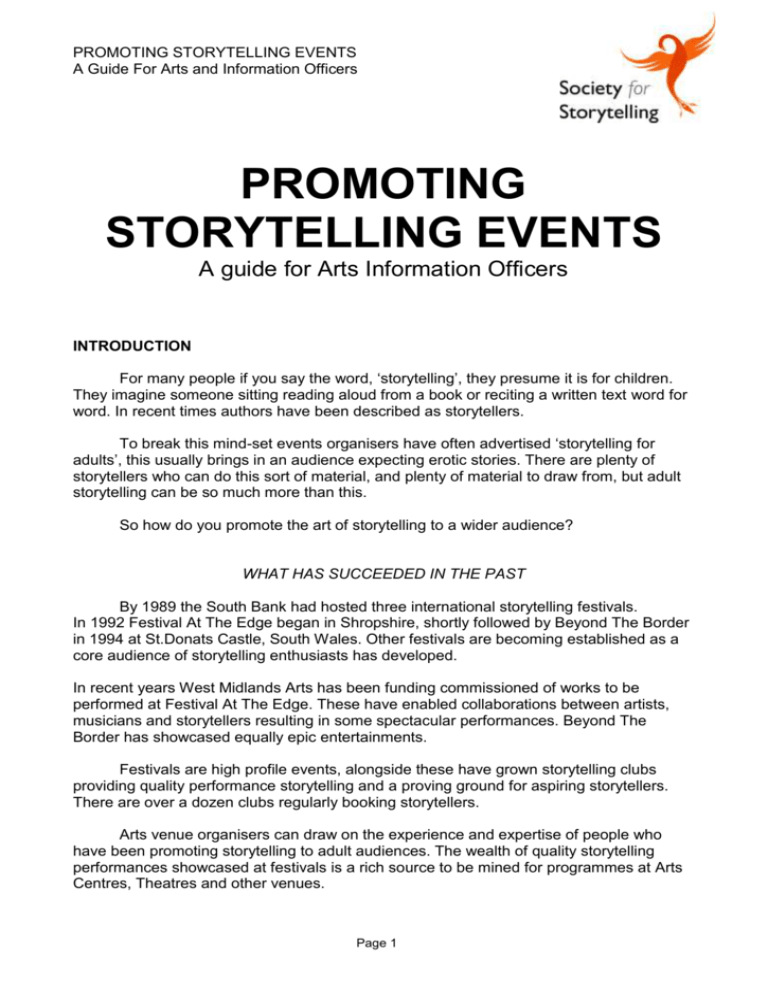
PROMOTING STORYTELLING EVENTS A Guide For Arts and Information Officers PROMOTING STORYTELLING EVENTS A guide for Arts Information Officers INTRODUCTION For many people if you say the word, ‘storytelling’, they presume it is for children. They imagine someone sitting reading aloud from a book or reciting a written text word for word. In recent times authors have been described as storytellers. To break this mind-set events organisers have often advertised ‘storytelling for adults’, this usually brings in an audience expecting erotic stories. There are plenty of storytellers who can do this sort of material, and plenty of material to draw from, but adult storytelling can be so much more than this. So how do you promote the art of storytelling to a wider audience? WHAT HAS SUCCEEDED IN THE PAST By 1989 the South Bank had hosted three international storytelling festivals. In 1992 Festival At The Edge began in Shropshire, shortly followed by Beyond The Border in 1994 at St.Donats Castle, South Wales. Other festivals are becoming established as a core audience of storytelling enthusiasts has developed. In recent years West Midlands Arts has been funding commissioned of works to be performed at Festival At The Edge. These have enabled collaborations between artists, musicians and storytellers resulting in some spectacular performances. Beyond The Border has showcased equally epic entertainments. Festivals are high profile events, alongside these have grown storytelling clubs providing quality performance storytelling and a proving ground for aspiring storytellers. There are over a dozen clubs regularly booking storytellers. Arts venue organisers can draw on the experience and expertise of people who have been promoting storytelling to adult audiences. The wealth of quality storytelling performances showcased at festivals is a rich source to be mined for programmes at Arts Centres, Theatres and other venues. Page 1 PROMOTING STORYTELLING EVENTS A Guide For Arts and Information Officers FORMAT Storytelling is a communication between the teller and the audience. In order for this communication to be successful it is important for the teller to be able to see the audience. When setting up the venue, try to avoid setting the storyteller too high above the audience, arrange lighting so it does not prevent the teller making eye contact with the audience and keep the house lights up. (You can dip the house lights to quiet the audience but then fade them up slowly as the performance begins.) Due to the wide range of storytelling styles, organisers should discuss specific requirements relating to the stage set-up, refreshment breaks and running times, with the storyteller/s in advance. COMPERING THE EVENT You may wish to introduce the storyteller/s before the performance or you may rely on the audience having read the programme. This varies from venue to venue, talk to the storyteller/s and do what feels right to you. PUBLICITY You will already have a number of regular outlets for your publicity: handouts, programmes of events, contacts with newspapers and local radio. In addition to this the Society for Storytelling gives free listings for storytelling events in the Storytelling Diary, this is sent out to all SfS members and is available on our website. It is updated quarterly in March, June, September and December. You can email the details of your event to the website manager and even if you are too late to get into the Diary he circulates information to a list of people who have requested regular news updates every week. Some storytelling enthusiasts will travel a considerable distance to see a favourite storyteller. Given peoples misconceptions of what storytelling is, how do you describe it in your publicity? Storytellers are not yet household names so you need to emphasise the title and content of the programme, use evocative language, which mirrors the style of the performance. Dramatic impact in the title, write-up and visual imagery is vital. Emphasise that this is storytelling as you have never heard it before, one of the successful Storytelling Café leaflets invited people to, ‘Treat yourself to the luxury of listening.’ You might consider organising an evening entertainment mixing different styles of performance. Windsor Arts Centre held an evening where a poet, a modern blues singer and a storyteller worked together, each artist brought in a different audience who was then introduced to other art forms. If you are booking a storyteller from a specific ethnic background, ensure publicity is sent to relevant places where members of that ethnic community will see it. They may then come to other events you are putting on. Page 2 PROMOTING STORYTELLING EVENTS A Guide For Arts and Information Officers FUNDING Funding criteria change from year to year. Storytelling performances can be linked to projects that are cross-generational and/or multicultural. Developing new audiences has been a recent theme, which is very pertinent to storytelling as an emerging art form. There are a growing number of British Sign Language interpreters who work with storytellers, enabling them to reach and empower those often unable to enjoy this kind of entertainment. Storytelling has in the past come under literature development but it may soon have a National Arts Officer appointed by the Arts Council of England. This will make it much simpler for Arts Officers looking to fund storytelling events and projects. FINAL WORD Storytelling is one of the oldest forms of entertainment, its’ direct simplicity has a unique power. Storytelling entertains, enlightens, and gives audiences enormous scope to interpret the stories in their own way. Humans think in narrative, the story form is as natural to us as breathing; oral storytelling is an extension of this and reflects our experience and environment. Be it traditional folktales, ancient or urban myths, stories speak to us. Since the beginning of the storytelling revival, in the mid 1970’s, a wealth of quality performers have emerged. Opportunities for training and experience increase each year, such as West Midlands Arts apprenticeships and the School of Storytelling at Emerson College, this is reflected in the number of excellent storytellers performing throughout the country. The Society for Storytelling produces a Directory of Storytellers that is updated annually; it is a vital tool for contacting storytellers. (A Directory order form is on the back page.) The SfS does not recommend individual storytellers as we have not seen every storyteller in the country, we advise you to ask for and take up references. Audiences for storytelling are growing at an even greater pace as more and more people have their appetites whetted for oral stories. Now is the time to take the plunge and start looking seriously at the art of oral storytelling. By Tina Bilbé and Del Reid Page 3
